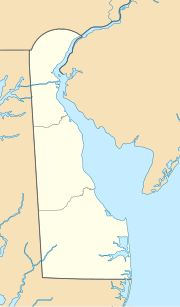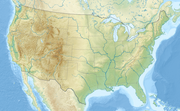Mill Creek (Smyrna River tributary)
Appearance
| Mill Creek Tributary to Smyrna River | |
|---|---|
| Location | |
| Country | United States |
| State | Delaware |
| County | Kent |
| City | Smyrna |
| Physical characteristics | |
| Source | Sewell Branch divide |
| • location | about 0.25 miles east of Underwood Corners, Delaware |
| • coordinates | 39°14′41″N 075°40′11″W / 39.24472°N 75.66972°W[1] |
| • elevation | 45 ft (14 m)[2] |
| Mouth | Smyrna River |
• location | about 1 mile northeast of Smyrna, Delaware |
• coordinates | 39°20′05″N 075°35′07″W / 39.33472°N 75.58528°W[1] |
• elevation | 0 ft (0 m)[2] |
| Length | 8.97 mi (14.44 km)[3] |
| Basin size | 12.63 square miles (32.7 km2)[4] |
| Discharge | |
| • average | 15.38 cu ft/s (0.436 m3/s) at mouth with Smyrna River[4] |
| Basin features | |
| Progression | generally northeast |
| River system | Smyrna River |
| Tributaries | |
| • left | unnamed tributaries |
| • right | unnamed tributaries |
| Waterbodies | Lake Como |
| Bridges | Underwoods Corner Road, Alley Corner Road, DE 300, Carter Road, US 13, DE 1, DE 6 |
Mill Creek is a 8.97 mi (14.44 km) long 3rd order tributary to Smyrna River in Kent County, Delaware.
Course
[edit]Mill Creek rises on the Sewell Branch divide about 0.25 miles east of Underwood Corners in Kent County. Mill Creek then flows northeast to meet the Smyrna River about 1 mile northeast of Smyrna, Delaware.[2]
Watershed
[edit]Mill Creek drains 12.63 square miles (32.7 km2) of area, receives about 44.9 in/year of precipitation, has a topographic wetness index of 631.41 and is about 2.1% forested.[4]
See also
[edit]References
[edit]- ^ a b "GNIS Detail - Mill Creek". geonames.usgs.gov. US Geological Survey. Retrieved 2 March 2020.
- ^ a b c "Duck Creek Topo Map, Kent County DE (Smyrna Area)". TopoZone. Locality, LLC. Retrieved 2 March 2020.
- ^ "ArcGIS Web Application". epa.maps.arcgis.com. US EPA. Retrieved 2 March 2020.
- ^ a b c "Mill Creek Watershed Report". Waters Geoviewer. US EPA. Retrieved 2 March 2020.


